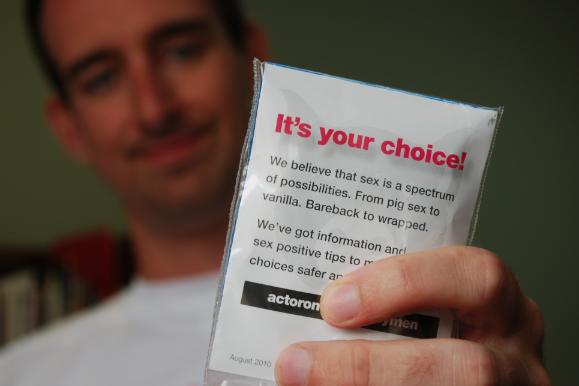Rather than condemning barebacking, the AIDS Committee of Toronto (ACT) is offering harm-reduction information in its condom kits.
ACT’s position is that condoms are always the best choice, says Andrew Brett, communications coordinator at ACT. Even so, it’s important to acknowledge the reality, which is that some people don’t use condoms.
“People will make their own choices about sex, so it’s best they have the tools to make sex safer,” he says.
The condom package reads, “It’s your choice. We recognize that sex is a spectrum of possibilities. From pig sex to vanilla. Barebacking to wrapped.”
One gay man who took a free condom from an ACT volunteer at the Inside Out Film Festival reacted later with anger on Facebook, calling the message “appalling” and “morally despicable.”
But there’s no point ignoring that barebacking exists, Brett says. It’s better to discuss it and raise awareness about all preventive strategies.
“People are going to have sex, and it’s their choice in whatever sex they have,” he says. “If someone is going to have bareback sex, there’s nothing we can say that is going to stop them. We still have information for them to make it safer.”
Brett offers an example: using more lube reduces the likelihood of skin tears.
It’s a touchy issue, but at least people are talking, Brett says. The condom has opened the door to discuss sensitive issues.
“We recommend condom use. But we recognize the reality of our sex lives,” he says. “I’m glad it’s created an opportunity to have a discussion. We need to have discussions about what our sex lives actually are and not pretend that everyone is always using a condom every single time.”
Todd Klinck, co-owner of Goodhandy’s, calls the campaign “smart” and says he has no problems with ACT’s decision to provide harm-reduction information about barebacking. But, outside of the campaign, he worries that the subculture of barebacking is becoming “normalized,” especially by the porn industry. Klinck doesn’t want young people getting the idea that it’s socially acceptable.
“[Barebacking] exists yes, and we should talk about it, but we shouldn’t normalize it.”
That’s something he already sees happening. In porn, barebacking is very common.
“The number-one porn is barebacking. Statistically, that’s what everyone wants to see.”
Brian Finch, founder and publisher of Positive Lite, sees many sides in this debate. Although he agrees with Brett that burying one’s head in the sand contributes to the problem, he says, barebacking shouldn’t be promoted.
“There’s so much controversy when this comes up,” Finch says. “I fall alongside with ACT on this. We have to acknowledge it, but I have to say I’m a little surprised to see it there.”
The bigger problem, Finch says, is how messages about HIV prevention have changed over the past number of years. Media campaigns have increasingly targeted people’s bad behaviour, like “the sex police.”
At the same time, Finch says, context is everything. If the ACT condoms were distributed at a school, he may have a different opinion.
“That may not be such a great idea,” he says. “When you’re handing out condoms to teenagers, maybe not include that message.”
Brett says ACT stocks a wide range of condom packages tailored for each outreach venue and event.
The package was handed out at Inside Out but was created in August 2010 for a discussion forum on “pig sex and how to make it safer.” Brett says each pack contains two condoms and two containers of lube. More than 60,000 packs were distributed since the launch of the campaign.
“These packs were so popular that we needed to print more,” he says.
Rui Pires, ACT’s gay men’s community education coordinator, says the condom packs were focus tested, along with a few other packs, with seven focus groups — in total 62 gay and bisexual men.
“Not a single man indicated they thought these packs advocated unprotected sex. Pig sex has specific connotations for a small subculture of gay men. What those connotations can mean varies from person to person.”

 Why you can trust Xtra
Why you can trust Xtra


